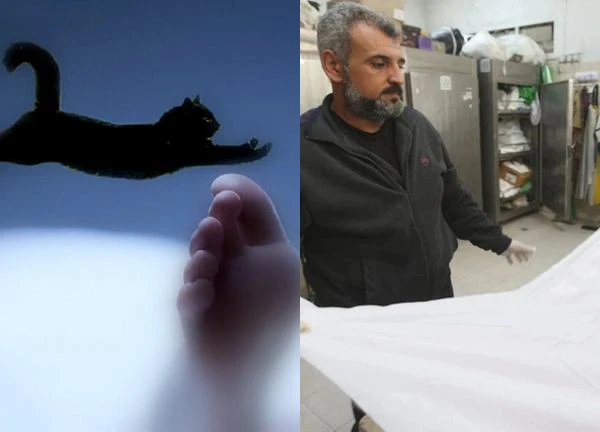Hong Hai passed away, his pregnant wife regretted not being determined to do this

5 | 1 Discuss | Share
Relatives of actor Hong Hai said that he had previously been hospitalized due to symptoms of body aches and jaundice. The doctor diagnosed him with end-stage cirrhosis, coagulation disorder, multi-organ failure, duodenitis, blood poisoning...
Sharing with the media, Ms. Le Thi Be Ngoan, 31 years old, said she was too shocked by the passing of her husband - actress Hong Hai, even though she had mentally prepared.
Three weeks ago, Hong Hai had severe abdominal pain, plus jaundice, so she went to the University of Medicine and Pharmacy Hospital in Ho Chi Minh City, People's Hospital 115 and Nguyen Tri Phuong Hospital.
The diagnosis results included end-stage cirrhosis and duodenitis, which shocked Hong Hai. Before that, he had had stomach pain many times, but subjectively thought it was normal pain so he just went to the store to buy medicine and took it lightly.
As a fitness trainer, Hong Hai is conscious of taking care of her own health. However, according to his wife, he smokes a lot, drinks occasionally, and after each weight-lifting competition, his health is more or less affected. From the time he discovered his illness to the time he passed away, he passed very quickly.
According to Dr. Le Van Thieu, Department of General Infections, Central Tropical Diseases Hospital, the liver is the second largest organ in the body, playing a vital role in metabolism and performing more than 500 functions. functions such as: glycogen storage, protein synthesis, plasma, detoxification...
Meanwhile, cirrhosis is a condition in which the liver's structure changes, forming abnormal scar tissue that causes liver cells to be damaged and rapidly decline.
When the liver has cirrhosis, the liver's important functions for the body decline, leading to serious complications: ascites; vomiting blood due to ruptured esophageal varices; hepatic coma; Kidney failure and the most dangerous is liver cancer.
Many Vietnamese habits lead to cirrhosis
According to Dr. Thieu, there are many causes that lead to cirrhosis, typically:
Common causes leading to cirrhosis include:
- Due to chronic hepatitis virus: People with hepatitis B and C, if not detected early and given timely treatment, will lead to cirrhosis and the disease will progress to the final stage. Many cases of end-stage cirrhosis are complicated by ascites. This is a dangerous complication that can be very dangerous if not treated promptly.
- Infection with toxic chemicals: When the body is contaminated with toxic chemicals such as arsenic, arsenic... or bile obstruction is also the cause of cirrhosis. However, these cases are rare in people with cirrhosis. If patients with cirrhosis due to toxic chemical exposure develop ascites, the disease progresses very quickly and has a high risk of death.
- Alcohol addiction: Long-term alcohol abuse causes liver function to gradually decline. Alcoholics also often do not pay attention to monitoring and treatment of the disease, making the condition worse.
In addition, if you do not limit alcohol consumption, your liver will become increasingly seriously damaged, leading to dangerous health complications.
"Many Vietnamese people have the habit of abusing alcohol. This is one of the shortest ways to destroy the liver and lead to cirrhosis," Dr. Thieu emphasized.
Recognize the warning signs of cirrhosis
Dr. Thieu informed that cirrhosis is an extremely dangerous disease. Only by understanding the symptoms of cirrhosis can we promptly treat and avoid life-threatening complications.
In the early stages (compensated cirrhosis)
Clinical symptoms are often unclear such as: digestive disorders, loss of appetite, fatigue, patients often feel mild pain or pressure in the right upper abdomen, often bloating, and nausea.
Full-blown stage
At this time, liver function has shown more obvious signs of decline, patients often have increased digestive disorders, obvious pain in the right flank, dark skin, weight loss, poor sleep, and in many cases yellow eyes. skin, or have dilated capillaries, numb limbs, itching, swollen ankles...
End stage (decompensated cirrhosis)
This is also called the stage of cirrhosis with ascites, the patient urinates very little, is thin, has difficulty breathing, dark yellow facial skin, dark complexion, severe illness can cause liver coma, gastrointestinal bleeding...
Diet for people with cirrhosis
Patients with cirrhosis need to eat foods that provide 2,500 - 3,000 calories per day, with appropriate food ingredients, complete with protein such as meat, fish, eggs, milk... rich in glucid like potatoes, cereals... and should use vegetable oil.
Avoid using animal fats, avoid using strange foods, foods that can easily cause allergies, easily cause digestive disorders, foods that need to be cooked to ensure hygiene and taste. Dishes should be changed so that the liver does not have to work too hard, food is absorbed better, avoid digestive disorders, it is best to divide the food into small portions, feed the patient 4-5 meals a day and supplement the food. Supplement vitamins with fruit juices and fruits.
It is necessary to limit salt and eat completely unsalted when you have edema and a large belly because eating a lot of salt will cause water retention in the cells, further increasing the edema. When suffering from edema, some diuretics must be used, which will cause potassium loss, making the patient more tired, so the patient needs to eat more potassium-rich foods to replenish the lost amount of potassium. However, people with late-stage cirrhosis need to limit protein-rich foods to prevent liver coma.
How to prevent cirrhosis
To prevent cirrhosis, you need to proactively protect your liver in the following ways:
- Hepatitis B vaccination for children and adults who are not sick.
- Have a healthy lifestyle, do not abuse alcohol.
- Avoid eating raw food, eat cooked food to avoid being infected with parasites.
- Use clean food, ensure food safety to prevent contamination with chemicals and toxic colors that damage the liver.
- Do not use drugs that affect the liver.
- For people with chronic hepatitis B or C, periodic monitoring is required every 3 months or every 6 months to detect and treat advanced cases of hepatitis early, to limit serious complications such as cirrhosis. liver and liver cancer.
- Periodic health check-ups to detect and treat early diseases that cause hepatitis due to other causes such as heart failure, biliary obstruction...
Hong Hai's wife did not accept the funeral and was immediately compared to Duc Tien's wife  Minh Lợi17:30:13 15/06/2024Actor Nguyen Hong Hai - who took on the role of Hai 33 in Vi Ca prequel: Little fish crossing the big sea - passed away on June 13, leaving his friends and Vietnamese stars shocked and sad.
Minh Lợi17:30:13 15/06/2024Actor Nguyen Hong Hai - who took on the role of Hai 33 in Vi Ca prequel: Little fish crossing the big sea - passed away on June 13, leaving his friends and Vietnamese stars shocked and sad.

5 | 1 Discuss | Share

1 | 1 Discuss | Share

4 | 1 Discuss | Share

2 | 1 Discuss | Share

2 | 1 Discuss | Share

3 | 1 Discuss | Share

2 | 1 Discuss | Share

1 | 1 Discuss | Share

3 | 1 Discuss | Share

5 | 1 Discuss | Share

3 | 1 Discuss | Share

1 | 1 Discuss | Share





2 | 1 Discuss | Report